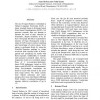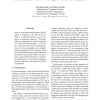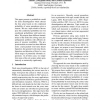82 search results - page 2 / 17 » Using Relevant Domains Resource for Word Sense Disambiguatio... |
COLING
2008
13 years 6 months ago
2008
The use of topical features is abundant in Natural Language Processing (NLP), a major example being in dictionary-based Word Sense Disambiguation (WSD). Yet previous research does...
ACL
2007
13 years 6 months ago
2007
When a word sense disambiguation (WSD) system is trained on one domain but applied to a different domain, a drop in accuracy is frequently observed. This highlights the importance...
ACL
2010
13 years 2 months ago
2010
This paper presents a probabilistic model for sense disambiguation which chooses the best sense based on the conditional probability of sense paraphrases given a context. We use a...
LREC
2010
13 years 6 months ago
2010
Sense-tagged corpora are used to evaluate word sense disambiguation (WSD) systems. Manual creation of such resources is often prohibitively expensive. That is why the concept of p...
BMCBI
2010
13 years 4 months ago
2010
Background: Word sense disambiguation (WSD) algorithms attempt to select the proper sense of ambiguous terms in text. Resources like the UMLS provide a reference thesaurus to be u...



